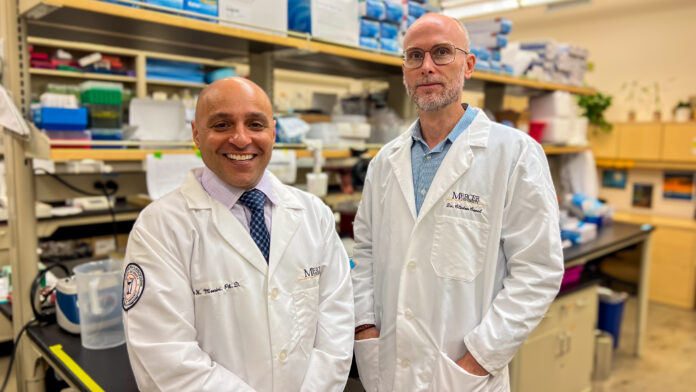Channel Therapeutics, a pharmaceutical startup founded by Mercer University College of Pharmacy faculty members Dr. Clinton Canal and Dr. Nader Moniri, has received the Entrepreneur and Innovation Award from the Georgia Research Alliance for its groundbreaking work in developing new therapies for bradycardia, a condition where the heart beats too slowly.
Dr. Lydia Newsom, clinical associate professor, serves as clinical advisor for the company, helping connect laboratory research to patient care.
Bradycardia, a condition defined by an abnormally slow heart rate, is estimated to affect between 0.5% and 2% of the worldwide population. Currently, it is treated with atropine, a drug derived from plants over a century ago. While atropine increases heart rate, it blocks all five muscarinic acetylcholine receptors, leading to significant side effects, including cognitive impairment, memory loss, urinary retention, and constipation. This lack of receptor selectivity has restricted atropine’s use to short-term hospital settings, leaving patients without a safe long-term therapy other than invasive tools such as pacemakers.
“Bradycardia continues to be treated with decades-old, poorly selective drugs,” said Dr. Canal. “By targeting the M2 muscarinic receptor subtype with precision, we have the potential to deliver a safer, more effective therapy that meets a critical unmet medical need.”
Previous attempts to develop selective M2 receptor antagonists failed due to poor selectivity, with none advancing successfully into clinical use. Channel Therapeutics’ compounds look to represent a first-in-class opportunity to selectively block the M2 receptor while sparing the others, potentially transforming care for patients with chronic or acute bradycardia or bradyarrhythmia, a similar condition.
Founded in 2021, Channel Therapeutics has designed and patented a portfolio of more than 60 molecules, including two preclinical leads that demonstrate exceptional M2 receptor affinity and selectivity. These candidates are being advanced through early-stage safety and efficacy testing to prepare for clinical trials. Mercer will own the rights to this technology while Channel Therapeutics licenses it.
The company’s selective M2 receptor antagonists could replace atropine in both acute hospital settings — such as ablation surgery for atrial fibrillation, where atropine use is increasing — and chronic outpatient management of persistent bradycardia or bradyarrhythmia. With no selective therapy currently on the market, the potential impact for patients and health care providers is substantial. The company plans to expand its technology toward the treatment of other diseases where selective M2 receptor targeting would be desirable.
The recognition comes through the Georgia Research Alliance’s Innovation & Entrepreneurship program, which has supported the launch and growth of university-based startups across Georgia since 2003. By providing early-stage funding, mentorship and connections to industry leaders, the program has attracted outside investment, created jobs in science and technology, and generated tax revenue for the state. It has also fostered collaboration between universities and industry while encouraging faculty-led entrepreneurship.
Dr. Moniri added, “This award from GRA validates the importance of our work and gives us the resources to take first steps towards advancing two promising candidates to the clinic. We are excited to move closer to offering cardiologists and patients a new standard of care.”










